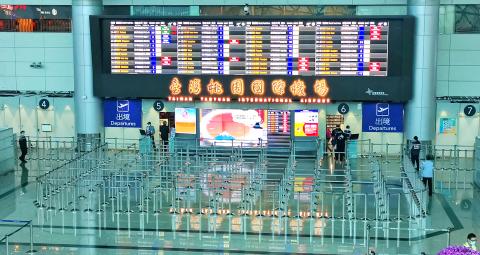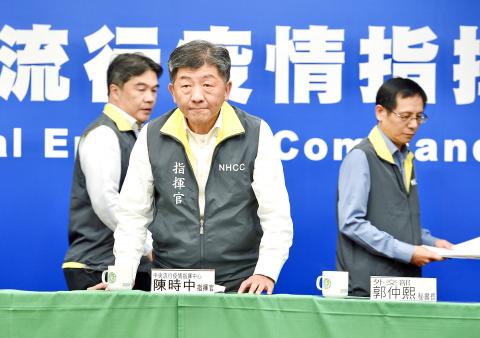The Central Epidemic Command Center (CECC) yesterday announced that Chinese minor children of Taiwanese and Chinese couples would continue to be banned from entering Taiwan.
At their regular weekly meeting yesterday, President Tsai Ing-wen (蔡英文) and Premier Su Tseng-chang (蘇貞昌) overturned a policy announced by the Mainland Affairs Council (MAC) on Tuesday that would have allowed the children entry under special conditions, the center said.
Facing a widespread outbreak of COVID-19 in China, the center announced a ban on the entry of Chinese visitors from Thursday last week, but the council initially relaxed the policy on Tuesday.

Photo: Tony Yao, Taipei Times
Minister of Health and Welfare Chen Shih-chung (陳時中), who heads the center, yesterday told a news conference in Taipei: “We are revoking all the control measures allowing Chinese minor children of Taiwanese and Chinese couples to return to Taiwan announced by the MAC on Tuesday.”
“Chinese children of Taiwanese and Chinese couples who do not have nationality of our country and are still in China, Hong Kong or Macau will not be allowed to enter Taiwan,” he said.
The MAC had announced that the exception would allow Chinese minor children of Taiwanese and Chinese couples who have an Alien Resident Certificate or a long-term visa for visiting family or relatives to enter Taiwan, but they would be placed in home quarantine for 14 days after arrival.

Photo: Peter Lo, Taipei Times
The announcement quickly sparked public confusion and criticism, with the MAC on Tuesday night saying that the policy had been narrowed to only include Chinese children who are under 18 years old, “have been living in Taiwan” and “have no one to take care of them in China,” adding that they must apply for entry and gain approval from the National Immigration Agency.
Chen yesterday said that anyone who is in Taiwan would receive equal medical treatment if they are infected, and anyone who is in home isolation or home quarantine in Taiwan would also be regulated equally.
“However, there must be a differentiation at border controls and priority is given to Taiwanese,” he said.
Many Taiwanese in China are likely to return for the Tomb Sweeping Day holiday, so the center is worried that loosening border controls would cause a capacity shortage, he added.
About 5,000 people are placed in home quarantine every day and as quarantines last 14 days, there would be more than 70,000 people in home quarantine every day and more people are needed to monitor them, Chen said.
COVID-19 testing capacity has increased to about 1,010 people per day, but two test results are required to confirm each case and about 40 percent of the nation’s 1,100 negative pressure isolation rooms are being used, so some capacity must be reserved for possible emergency situations, he said.
“We know there is kinship between Chinese minor children and their Taiwanese parents, but our principle is to put Taiwanese first,” Chen said. “There are already many problems to deal with among Taiwanese, such as those who are ill, but stranded in Wuhan [the epicenter of the outbreak in China]… Emergency rescue operations could be needed at any time.”
“We will not allow our medical and related capacity to be used on non-Taiwanese. Of course, we hope to help others if we have spare capacity, but the CECC will have failed in its duty if we cannot act within our power,” he said.
Chinese minor children of Taiwanese and Chinese couples could not have been left alone in China without caregivers, as their parents must have made arrangement for them before returning to Taiwan, Chen said.
“Moreover, they [parents] had the option to choose their nationality in the first place, but they did not choose Taiwan, so they must make proper arrangements for themselves and bear the consequences now,” he said.

NATIONAL SECURITY THREAT: An official said that Guan Guan’s comments had gone beyond the threshold of free speech, as she advocated for the destruction of the ROC China-born media influencer Guan Guan’s (關關) residency permit has been revoked for repeatedly posting pro-China content that threatens national security, the National Immigration Agency said yesterday. Guan Guan has said many controversial things in her videos posted to Douyin (抖音), including “the red flag will soon be painted all over Taiwan” and “Taiwan is an inseparable part of China,” while expressing hope for expedited “reunification.” The agency received multiple reports alleging that Guan Guan had advocated for armed reunification last year. After investigating, the agency last month issued a notice requiring her to appear and account for her actions. Guan Guan appeared as required,

Japan and the Philippines yesterday signed a defense pact that would allow the tax-free provision of ammunition, fuel, food and other necessities when their forces stage joint training to boost deterrence against China’s growing aggression in the region and to bolster their preparation for natural disasters. Japan has faced increasing political, trade and security tensions with China, which was angered by Japanese Prime Minister Sanae Takaichi’s remark that a Chinese attack on Taiwan would be a survival-threatening situation for Japan, triggering a military response. Japan and the Philippines have also had separate territorial conflicts with Beijing in the East and South China

A strong cold air mass is expected to arrive tonight, bringing a change in weather and a drop in temperature, the Central Weather Administration (CWA) said. The coldest time would be early on Thursday morning, with temperatures in some areas dipping as low as 8°C, it said. Daytime highs yesterday were 22°C to 24°C in northern and eastern Taiwan, and about 25°C to 28°C in the central and southern regions, it said. However, nighttime lows would dip to about 15°C to 16°C in central and northern Taiwan as well as the northeast, and 17°C to 19°C elsewhere, it said. Tropical Storm Nokaen, currently

PAPERS, PLEASE: The gang exploited the high value of the passports, selling them at inflated prices to Chinese buyers, who would treat them as ‘invisibility cloaks’ The Yilan District Court has handed four members of a syndicate prison terms ranging from one year and two months to two years and two months for their involvement in a scheme to purchase Taiwanese passports and resell them abroad at a massive markup. A Chinese human smuggling syndicate purchased Taiwanese passports through local criminal networks, exploiting the passports’ visa-free travel privileges to turn a profit of more than 20 times the original price, the court said. Such criminal organizations enable people to impersonate Taiwanese when entering and exiting Taiwan and other countries, undermining social order and the credibility of the nation’s